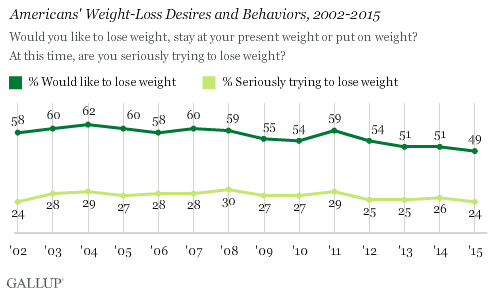Some important Note on this topics :
• 41 percent would like to keep on at current weight
• Less than 1 in 4 seriously trying to drop weight
• Americans as much again as likely to want to lose weight as to be sincerely trying
In addition to being less likely to say they want to lose weight in up to date years, fewer Americans say they are making a combined effort to do this. Less than 24% of adults report they are acutely trying to weight loss.
More than one hundred eighty six million American adults - or 8 out of 10 male and female aged eighteen and older - are weight aware, according to a new nationwide survey released this week by the CCC. Less than five out of 10 (49%) want to decrease their weight and well-known that exercise, cutting back on sugar, using low-fat or concentrated sugar products, and restricting the size of something to eat portions are the most common plans. An additional 28% of Americans are trying to control their weight.
America’s perception on weight concerns appears to be well-founded. The new numbers from the Centers for Disease Control and Prevention (CDC) and National Center for Health (NCH) Statistics show that 2-thirds of American adults are overweight or obese.
The Health Effect of Overweight
People who are overweight, compared to those with a standard or a healthy weight, are at enlarged risk for lots of serious diseases and health conditions, counting the following:
• All-causes of death
• Blood pressure high
• Low HDL cholesterol, High LDL cholesterol
• Type 2 diabetes
• Coronary heart syndrome
• Stroke
• Gall bladder syndrome
• Breathing problems and sleep apnea
Although America’s have a serious weight problem, the good news is that many and many people are trying to lose weight.
How to lose weight Quickly :
Are you exhausted of carrying around extra pounds? You can gain knowledge of weight loss, as well as habits to eat healthier, do more exercise, and stay yourself motivated to keep the pounds off the healthy method.
Fresh fruits and vegetables, eat more and more. The fruit helps to assure your sweet tooth thanks to its normal sugars, while green vegetables help you fill up more firstly. Fruits and vegetables include fiber to help you feel full quickly. Try some of these guidelines to introduce more fruit and vegetables into your diet:
• Eat what's in period, and eat fruit and vegetables for snacks, or for wilderness. When you eat apples in the fall, for instance, otherwise cherries in behind summer, it might as well be an indulgent dessert. Cut to pieces celery, carrots, peppers, broccoli or cauliflower and dip them in a raw salad dressing or hummus.
• Use vegetables as a main meal plate. For example, make a deep-fry or a hearty meal salad and put in just a few ounces of cooked chicken, salmon or almonds.
Note down the whole thing you eat this week. The public who keeps food diaries, according to a study published in the Journal of the Academy of Nutrition and Dietetics, lose weight an average of six pounds (2.75 kg) more than people who don't maintain a record of everything that they eat. So force by hand to write down the good, the bad and the ugly. Remain these guidelines in mind:
• Be complete. Write it all down, including beverages, spices, and a description of how the food was equipped. Don't try you didn't have that extra glass of wine after breakfast and dinner. If it goes into your belly, it goes into the diary.
• Be proper. Trace your portion sizes in your food diaries. Don't eat so little hugely - Keep track. Also, study the ingredients list in order that you can be properly about serving sizes.
• Be regular. Carry your food journal everywhere you make use of a diet-tracking app on your tablet or smartphone.
Start doing basic exercise. Start with a small target of 45 minutes, 3 times per week if you don't exercise then you will become overweight. Start walking now, You can also try other low-impact military exercises like swimming, slow running, or riding a bike.
64% of Americans trying 45 minutes of exercise three times per week for weight. Also have other trendy methods of overweight control such as only 17% omit meals to diet, thirteen percent (13%) use diet pills supplementary and eight percent (8%) follow the preventive weight loss diet.







0comments:
Post a Comment